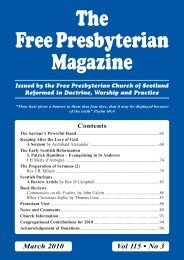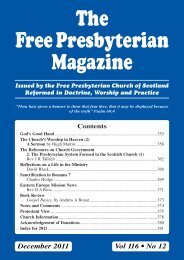May - the Free Presbyterian church of Scotland
May - the Free Presbyterian church of Scotland
May - the Free Presbyterian church of Scotland
You also want an ePaper? Increase the reach of your titles
YUMPU automatically turns print PDFs into web optimized ePapers that Google loves.
142<br />
The <strong>Free</strong> <strong>Presbyterian</strong> Magazine<br />
blasphemous. It does not appear that <strong>the</strong>y separated from <strong>the</strong> Church although<br />
<strong>the</strong>y were withholding <strong>the</strong>ir ti<strong>the</strong>s.<br />
Perhaps <strong>the</strong> most surprising thing is <strong>the</strong> strength <strong>of</strong> <strong>the</strong>ir opposition to <strong>the</strong><br />
Pope. They regarded him as an imposter and a wicked man, and it is remarkable<br />
that people in <strong>the</strong>ir position should have had such views. The Pope was<br />
a long way away and one wonders why <strong>the</strong>y were even thinking about him.<br />
Probably this indicates a legacy from <strong>the</strong> writings and teachings <strong>of</strong> Wycliffe<br />
120 years earlier. Wycliffe moved in high political circles in which <strong>the</strong> Pope<br />
was a major figure. The point here is that people’s view <strong>of</strong> <strong>the</strong> Church and <strong>of</strong><br />
Romanism will depend not only on having <strong>the</strong> Bible but also on <strong>the</strong><br />
teaching that <strong>the</strong>y have received. These people had received good teaching<br />
through Wycliffe but <strong>the</strong>re were o<strong>the</strong>r early Protestants who did not have<br />
such advantages.<br />
One o<strong>the</strong>r thing to notice is that <strong>the</strong>re is nothing in <strong>the</strong> articles about <strong>the</strong> doctrine<br />
<strong>of</strong> justification by faith. Possibly this is because <strong>the</strong> articles were drawn<br />
up by an ignorant enemy who was trying to blacken <strong>the</strong>m. If <strong>the</strong>y had<br />
drawn up <strong>the</strong>ir own articles <strong>the</strong>re might have been a very different emphasis.<br />
Before moving on to Patrick Hamilton, we mention in passing that Lu<strong>the</strong>ran<br />
books were coming into <strong>Scotland</strong> by July 1525. These were in Latin, but<br />
<strong>the</strong>y were being read in monasteries and universities; and, after 1526, copies<br />
<strong>of</strong> Tyndale’s New Testament were coming into <strong>Scotland</strong>. This was in English,<br />
so <strong>the</strong> Word <strong>of</strong> God was becoming generally available so long as <strong>the</strong>re was<br />
someone around who could read English.<br />
(2.) Patrick Hamilton and his successors. Patrick Hamilton (1504-1528)<br />
was possibly born at Stonehouse, near Glasgow. He studied at Paris and St<br />
Andrews and was converted, probably through <strong>the</strong> imported Lu<strong>the</strong>ran books<br />
that we have mentioned. He became an open Protestant in 1526. In 1527<br />
Archbishop James Beaton cited him to answer for his heretical beliefs, and<br />
Hamilton escaped from this by fleeing to Germany. After six months he<br />
deliberately returned to <strong>Scotland</strong> knowing what <strong>the</strong> cost was likely to be. He<br />
was apprehended and tried by Archbishop Beaton and o<strong>the</strong>rs, and put to<br />
death on 29 February 1528. The two main sources for his <strong>the</strong>ological beliefs<br />
are <strong>the</strong> articles that were alleged against him at his trial and his short book<br />
usually known as Patrick’s Places. This was a Latin composition translated<br />
into English by John Frith, and published in London about 1532 with <strong>the</strong> title,<br />
Divers Fruitful Ga<strong>the</strong>rings <strong>of</strong> Scripture. It is mainly an exposition <strong>of</strong> <strong>the</strong><br />
doctrine <strong>of</strong> justification by faith.<br />
As far as his view <strong>of</strong> Rome is concerned, we get more from <strong>the</strong> articles<br />
alleged against him at his trial. Here are some <strong>of</strong> <strong>the</strong>m, as given in Spottiswoode’s<br />
History: “(1) That <strong>the</strong> corruption <strong>of</strong> sin remains in children after

















